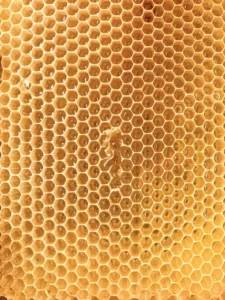Table of Contents
Introduction
Honey is a delicious and nutritious natural sweetener made by bees from flower nectar. It comes in various colors, ranging from dark golden brown to light shades of gold, depending on the flowers the bees collect nectar from. In this article, we will discuss the health benefits of raw honey and compare it to manuka honey.
What is Raw Honey?
Raw honey is honey that has never been processed. It has never been heated above 35°C/95°F and is often unfiltered. While it may undergo straining to remove impurities such as wax, wings, legs, or bees, the pollen and propolis are still present. Propolis, a substance made by bees, contains beneficial compounds such as antioxidants and amino acids, which contribute to its antimicrobial, antioxidative, anti-ulcer, and anti-tumor properties.
What is Organic Raw Honey?
Organic raw honey is similar to raw honey in terms of processing, but it adheres to the regulations set by each country for organic farming. This means that the bees’ surrounding area, where they collect nectar, must be free of pesticides. By choosing organic raw honey, you can ensure that you are consuming a product that is free from harmful chemicals.
Health Benefits of Raw Honey
-
Excellent Source of Energy: Raw honey is packed with carbohydrates, making it a great source of energy. Athletes often consume it as part of their pre or post-workout snack to fuel their workouts and replenish their energy stores.
-
Low Glycemic Load: Despite being 80% sugar, raw honey has a low glycemic load of only 10. This means it does not cause a rapid spike in blood sugar levels like white processed sugar does. When combined with cinnamon, raw honey can even have a blood sugar-lowering effect.
-
Promotes Better Sleep: Raw honey can help regulate your sleeping patterns by aiding in the release of melatonin, a hormone responsible for inducing sleep. Good quality sleep is essential for overall health and can lower the risk of various diseases.
-
Rich in Antioxidants: Raw honey contains polyphenols and flavonoids, which are powerful antioxidants. These compounds help lower the risk of cancers and heart disease by neutralizing harmful free radicals in the body.
-
Natural Antibacterial Properties: The antibacterial properties of raw honey make it useful for treating burns, wounds, and gingivitis. It can also be used as a natural cough syrup. However, more research is needed to fully support its effectiveness in treating acne.
-
Relieves Nausea: Raw honey, when combined with lemon and ginger, can help alleviate nausea. It is important to note that honey should not be added to hot tea, as high temperatures can destroy its beneficial nutrients.
-
Rich in Nutrients: Raw honey contains 22 amino acids, making it a complete protein. It is also packed with minerals such as iron, zinc, potassium, calcium, phosphorus, magnesium, and selenium. Additionally, it serves as a source of vitamins B1, B2, B3, B5, B6, and C, which are essential for the nervous system, skin health, and immune function.
-
Aids in Digestion: Raw honey contains enzymes that can help with indigestion. Some studies even suggest that it may assist in managing acid reflux, although more research is needed to confirm this.
-
Potential Weight Loss Aid: Research indicates that raw honey may help with weight loss by curbing cravings and regulating hormones associated with appetite. It has also been shown to lower cholesterol and triglyceride levels, reducing the risk of heart disease.
-
Allergy Relief: Raw honey has been found to help build tolerance to allergies, including those caused by animals or seasonal factors. By consuming local raw honey, you may experience relief from your allergy symptoms.
Processed Honey
Processed honey is honey that has been heated and filtered. It often undergoes a process called ultra-filtering, which removes the pollen to extend its shelf life. Processed honey is usually clear and smooth in appearance, making it more visually appealing to consumers. However, it lacks the health benefits associated with raw honey.
When honey is heated above 35°C/95°F, its nutrients, vitamins, minerals, enzymes, and propolis are destroyed. The removal of pollen further diminishes the remaining health benefits. In fact, the FDA states that processed honey cannot be called honey due to the loss of its health properties. Moreover, some manufacturers even add corn syrup, which is a highly processed and unhealthy form of sugar, to processed honey.
Bees at farms that produce processed honey are often treated with antibiotics due to the presence of parasites and bacteria in their hives. Chemical processing and contamination can also occur during the production of poor-quality honey. These factors make it difficult to determine the true origin and quality of processed honey.
What is Manuka Honey?
Manuka honey is derived from the manuka plant native to New Zealand. It is known for its exceptional health benefits and is often considered superior to raw honey. The Unique Manuka Factor (UMF) is used to measure the antibacterial properties of manuka honey, ensuring its quality and suitability for medicinal use. Different UMF levels indicate varying levels of quality, with UMF16 and above considered to be superior.
Manuka Honey vs Raw Honey
When comparing manuka honey and raw honey, it is important to consider their individual characteristics and benefits. Manuka honey offers unique antibacterial properties and is graded based on its UMF level. On the other hand, raw honey provides a wide range of health benefits, including energy boost, low glycemic load, better sleep, antioxidants, antibacterial properties, and more.
Both manuka honey and raw honey have their merits, and the choice ultimately depends on personal preferences and specific health needs. It is worth noting that manuka honey is not recommended for children under 2 years of age.
What to Look for When Buying Honey
With processed honey dominating the supermarket shelves, it can be challenging to find raw honey. However, there are a few indicators to help you identify raw honey:
- Look for the words “Unpasteurized,” “Unfiltered,” “Unprocessed,” and “Raw honey” on the label.
- Raw honey often appears cloudy or creamy and may crystallize over time.
- Consider sourcing honey from reputable bee farms or farmers markets, where you can buy it directly from the farmer.
Raw Honey Precautions
While honey is generally safe for consumption, there are a few precautions to keep in mind:
- Avoid Giving Honey to Children Under 12 Months: Honey may contain botulism spores that can be harmful to babies. However, it does not pose a risk to older children and adults.
- Moderate Consumption: While safe in food quantities, excessive consumption of honey can lead to mild honey intoxication, characterized by symptoms like nausea, sweating, weakness, and dizziness.
- Consult with Your Doctor: If you are on medication for seizures, blood thinners, or any medication that affects your blood sugar levels, it is advisable to consult with your doctor before consuming honey. Additionally, individuals with weakened immune systems or allergies to pollen, celery, or bee products should seek medical advice.
- Avoid Honey Heated Above 60°C/140°F: Honey heated to these temperatures can produce a carcinogenic compound called hydroxymethyl furfuraldehyde (HMF), which may pose health risks.
In conclusion, both manuka honey and raw honey offer unique health benefits. Manuka honey is renowned for its antibacterial properties, while raw honey provides a wide range of nutrients, antioxidants, and other health-boosting compounds. When purchasing honey, it is important to choose raw honey and look for specific labeling indications. However, it is essential to exercise caution and consult with a healthcare professional when necessary.



